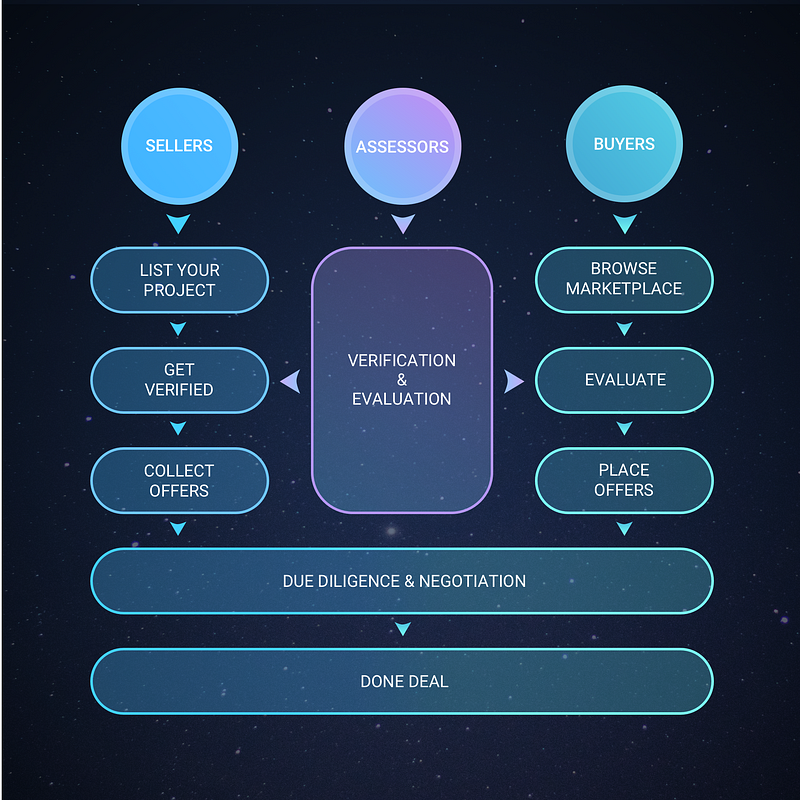There’s an enormous pool of excellent ideas and great technology out there, unutilized due to imperfect market conditions and archaic mediation practices. LEXIT taps into this pool, turning the tables on traditional M&A processes with the help of blockchain technology and network dynamics.
The amount of freshly incorporated startups, joining the global entrepreneurial community each year is huge, mind bogglingly huge.
According to GEM estimates, a staggering 100 million businesses are launched annually. This amounts to about three new startups each and every second, or to an unbelievable 11,000 new companies per hour.
However, when it comes to the survival rate of this outburst of raw entrepreneurial energy, the numbers have a somewhat sobering effect. About 96% of all new businesses will fail to survive their first year. The remaining 4% will either slowly wither away, or pivot dramatically in order to adjust to real-life market conditions.
This stern evolutionary funnel is of course an essential part of economic progress: everyone can give it a shot, but only the best-to-adapt survive. At the same time, in terms of resource efficiency, much is lost in this process.
Undoubtedly, some startups fail because they fundamentally just don’t make sense, and are a waste of everyone’s time. Many more, however, fail while driven by excellent ideas and equipt with decent technology. Startups in this group are very often mismanaged and are almost always underfunded — destined to vanish prematurely, taking invaluable knowledge and great ideas with them.
Even companies that turn out to be extremely successful, such Slack, Twitter, Instagram and many more, tend to have their attic full of unutilized ideas and abandoned Plan A’s that never made it to the markets, while others struggle to find exit strategies that reflect their true value.
Imperfect markets
In a perfect market, so we’re taught in economics 101, all of the above shouldn’t pose a problem. Theoretically speaking, market forces should make it so that every item of value — be it a good idea or useful lines of abandoned code — eventually finds its way towards utilization, as long as the effort is worth the while. Unfortunately, this is not the environment most startups operate in.
With millions of businesses forming and disintegrating annually, buyers and sellers have an unbelievable hard time to find each other and negotiate fairly. This results in imperfect flows of information, high mediation costs, and expensive overhead, which render Merger & Acquisition processes extremely complicated.
A team, putting a halfways finished application on hold in order to pivot towards a more promising business strategy, has close to zero opportunities to sell the technology invested in its app — even though this exact technology might be another startup’s missing link to success. Similarly, a medium-tier startup developing a product with great potential, might find it hard to formalize an exit strategy that reflects its true value.
In fact, the LEXIT vision was originally conceived when the team’s co-founders actively searched for opportunities to exit their previous projects. Their efforts eventually bore fruit, but the team remained with the understanding that in the age of network communication and blockchain technology, the M&A industry can and should be revolutionized.
Disintermediation to the rescue
What is needed, if so, is marketplace matching buyers and sellers of technology, IP, ideas, and entire companies, in a way that allows for quick and accurate price discovery mechanisms, while minimizing mediation and overhead costs. This, however, is not a trivial task.
Conducting a successful M&A funnel entails the posing of anonymous bids, which are then audited by third party appraisers before negotiations and in-depths due diligence may begin. This process is normally mediated by middlemen which aim to connect sellers and potential buyers in a s discreet manner. Doing what middlemen do, their services, albeit necessary, tend to result in restricted markets, slow processes, and high costs.
LEXIT turns the tables on these power relations.
On LEXITs M&A marketplace, an independent network of evaluated assessors and appraisers compete to provide evaluation and assessment services to buyers and sellers, which are empowered and encouraged to establish direct and discreet relations in a time conserving manner.

This allows sellers to present their offers to a massive crowd of potential buyers at once, without having to disclose their full identity (and potentially disrupting their ongoing business processes), while buyers can rest assured that all presented offers are in fact what they claim to be.
The market and network dynamics, necessary to create such a relationship between buyers, sellers, and independent appraisers, is made possible thanks to LXT — a cryptographic token carrying value across the LEXIT platform.

The LXT token flow also incentivises appraisers, as well as other independent third parties, to match between exiting startups and potential buyers of technology. With a professional network in place, analyzing buyer’s needs while understanding the seller supply side, deals are facilitated faster, more efficiently, and cheaper than ever before.
At LEXIT we believe that such an disintermediated M&A market is the missing piece of the startup ecosystem. Efficient and fair M&A deals aren’t only in the interest of startups and tech-companies, but also in the interest of the consumer and society in large. Tapping into the unutilized pool of millions of ideas, lines of code, and technological assets will lead to the advancement of all of us, and the shared prosperity we’re all hoping for.
